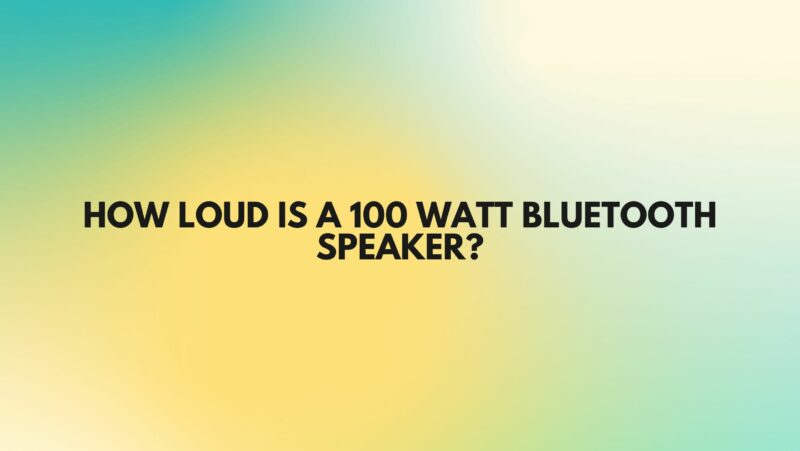When it comes to Bluetooth speakers, wattage is often cited as a measure of loudness and power. But how loud is a 100-watt Bluetooth speaker? In this comprehensive article, we’ll delve into the relationship between wattage and speaker volume, discuss the factors that affect perceived loudness, and help you understand what you can expect from a 100-watt Bluetooth speaker.
Wattage and Loudness
Wattage is a measure of electrical power, and in the context of speakers, it indicates the amount of power that the speaker’s amplifier can deliver to produce sound. While wattage does play a role in determining the potential volume a speaker can achieve, it is just one of several factors that influence perceived loudness:
- Speaker Sensitivity (Efficiency): Speaker sensitivity, often measured in decibels (dB), is a critical factor. It represents how efficiently the speaker converts electrical power into sound. A speaker with higher sensitivity can produce more sound output for a given amount of wattage.
- Speaker Size and Design: The physical size of the speaker drivers and the design of the speaker enclosure can affect the volume and clarity of the sound. Larger drivers can move more air, producing louder sound, especially in the bass frequencies.
- Amplifier Quality: The quality of the speaker’s amplifier and its ability to handle power efficiently also matters. A well-designed amplifier can maximize the speaker’s potential.
- Listening Environment: The size and acoustics of the room or outdoor space where you use the speaker can significantly impact how loud it sounds. Larger spaces may require more power to fill with sound effectively.
How Loud Is a 100-Watt Bluetooth Speaker?
The loudness of a 100-watt Bluetooth speaker can vary based on the factors mentioned above. However, a 100-watt speaker is generally capable of producing sound at a volume suitable for a variety of scenarios:
- Small to Medium Indoor Spaces: In smaller rooms or spaces, a 100-watt Bluetooth speaker can deliver ample volume for personal listening, parties, or gatherings. It should provide clear and loud sound without distortion.
- Outdoor Use: Outdoors, where ambient noise levels are higher, a 100-watt Bluetooth speaker can still be quite loud. It’s suitable for picnics, beach outings, and backyard gatherings, offering sound that can reach a reasonable distance.
- Room-Filling Sound: In a room with good acoustics, a 100-watt speaker can fill the space with music, making it an excellent choice for home entertainment systems or as a primary music source.
- Volume Control: Keep in mind that the perceived loudness also depends on how you control the volume. If you play music at lower volumes, a 100-watt speaker can deliver excellent sound quality without pushing its limits.
Factors to Consider
When evaluating a 100-watt Bluetooth speaker, consider these factors:
- Speaker Sensitivity: Look for speakers with higher sensitivity ratings (measured in dB) as they can produce louder sound more efficiently.
- Sound Quality: Wattage isn’t the only determinant of sound quality. Consider the overall design, driver size, and the quality of the audio processing components.
- Battery Life: If you plan to use the speaker for portable purposes, check the battery life to ensure it suits your needs.
- Connectivity and Features: Assess connectivity options, such as Bluetooth range, aux-in, and any additional features like EQ adjustments or app integration.
- Intended Use: Determine how and where you plan to use the speaker, whether indoors, outdoors, for parties, or personal listening, and choose accordingly.
Conclusion
A 100-watt Bluetooth speaker has the potential to produce sound at a volume suitable for various applications, from personal listening to outdoor gatherings. However, the perceived loudness depends on several factors, including speaker sensitivity, design, and the listening environment. When choosing a Bluetooth speaker, consider your specific needs and preferences, and remember that wattage is just one part of the equation when it comes to sound quality and volume.


